新目标七下英语unit1-unit2综合题
- 格式:doc
- 大小:101.50 KB
- 文档页数:9
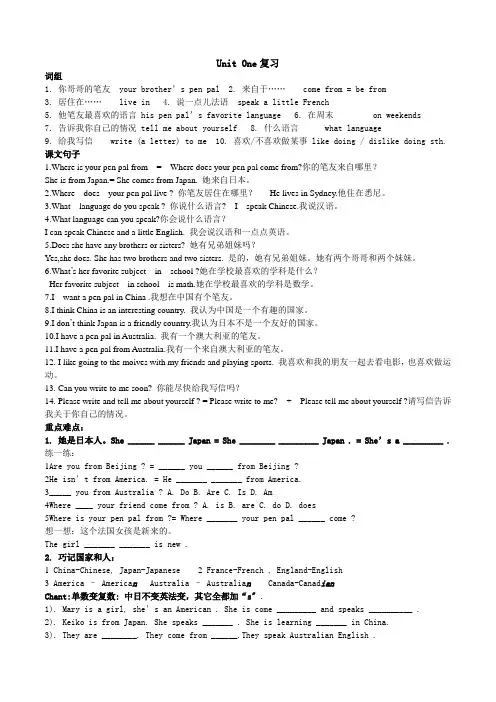
Unit One复习词组1. 你哥哥的笔友 your brother’s pen pal2. 来自于…… come from = be from3. 居住在…… live in4. 说一点儿法语 speak a little French5. 他笔友最喜欢的语言 his pen pal’s favorite language6. 在周末 on weekends7. 告诉我你自己的情况 tell me about yourself 8. 什么语言 what language9. 给我写信 write (a letter) to me 10. 喜欢/不喜欢做某事 like doing / dislike doing sth. 课文句子1.Where is your pen pal from = Where does your pen pal come from?你的笔友来自哪里?She is from Japan.= She comes from Japan. 她来自日本。
2.Where does your pen pal live ? 你笔友居住在哪里?He lives in Sydney.他住在悉尼。
3.What language do you speak ? 你说什么语言? I speak Chinese.我说汉语。
4.What language can you speak?你会说什么语言?I can speak Chinese and a little English. 我会说汉语和一点点英语。
5.Does she have any brothers or sisters? 她有兄弟姐妹吗?Yes,she does. She has two brothers and two sisters. 是的,她有兄弟姐妹。
她有两个哥哥和两个妹妹。
6.What’s her favorite subject in school ?她在学校最喜欢的学科是什么?Her favorite subject in school is math.她在学校最喜欢的学科是数学。
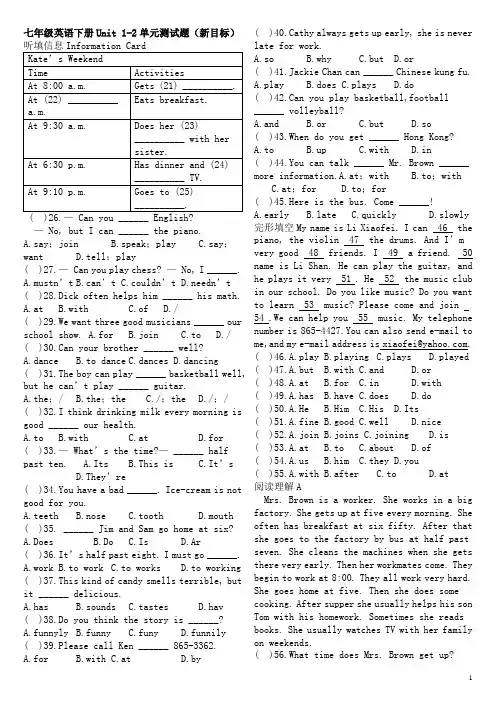
七年级英语下册Unit 1-2单元测试题(新目标)— No, but I can ______ the piano.A.say;joinB.speak;playC.say;wantD.tell;play( )27.— Can you play chess? — No, I ______.A.mustn’tB.can’tC.couldn’tD.needn’t ( )28.Dick often helps him ______ his math.A.atB.withC.ofD./( )29.We want three good musicians ______ our school show. A.for B.join C.to D./ ( )30.Can your brother ______ well?A.danceB.to danceC.dancesD.dancing( )31.The boy can play ______ basketball well, but he can’t play ______ guitar.A.the;/B.the;theC./;theD./;/ ( )32.I think drinking milk every morning is good ______ our health.A.toB.withC.atD.for( )33.— What’s the time?— ______ half past ten. A.Its B.This is C.It’sD.They’re( )34.You have a bad ______. Ice-cream is not good for you.A.teethB.noseC.toothD.mouth ( )35. ______ Jim and Sam go home at six? A.Does B.Do C.Is D.Ar( )36.It’s half past eight. I must go ______.A.workB.to workC.to worksD.to working ( )37.This kind of candy smells terrible, but it ______ delicious.A.hasB.soundsC.tastesD.hav( )38.Do you think the story is ______?A.funnylyB.funnyC.funyD.funnily ( )39.Please call Ken ______ 865-3362.A.forB.withC.atD.by ( )40.Cathy always gets up early, she is never late for work.A.soB.whyC.butD.or( )41.Jackie Chan can ______ Chinese kung fu.A.playB.doesC.playsD.do( )42.Can you play basketball,football______ volleyball?A.andB.orC.butD.so( )43.When do you get ______ Hong Kong?A.toB.upC.withD.in( )44.You can talk ______ Mr. Brown ______ more information.A.at;with B.to;withC.at;forD.to;for( )45.Here is the bus. Come ______!A.earlyteC.quicklyD.slowly 完形填空My name is Li Xiaofei. I can 46 the piano, the violin 47 the drums. And I’m very good 48 friends. I 49 a friend. 50 name is Li Shan. He can play the guitar, and he plays it very 51 . He 52 the music club in our school. Do you like music? Do you want to learn 53 music? Please come and join54 .We can help you 55 music. My telephone number is 865-4427.You can also send e-mail to me,and my e-mail address is xiaofei@. ( )46.A.play B.playing C.plays D.played ( )47.A.but B.with C.and D.or( )48.A.at B.for C.in D.with( )49.A.has B.have C.does D.do( )50.A.He B.Him C.His D.Its( )51.A.fine B.good C.well D.nice( )52.A.join B.joins C.joining D.is( )53.A.at B.to C.about D.of( ) B.him C.they D.you( )55.A.with B.after C.to D.at阅读理解AMrs. Brown is a worker. She works in a big factory. She gets up at five every morning. She often has breakfast at six fifty. After that she goes to the factory by bus at half past seven. She cleans the machines when she gets there very early. Then her workmates come. They begin to work at 8:00. They all work very hard. She goes home at five. Then she does some cooking. After supper she usually helps his son Tom with his homework. Sometimes she reads books. She usually watches TV with her family on weekends.( )56.What time does Mrs. Brown get up?A.5:00 a.m.B.5:30 a.m.C.6:00 a.m.D.6:30 a.m.( )57.What’s Mrs. Brown’s job?A.A teacher.B.A worker.C.A farmer.D.A driver.( )58.What does Mrs. Brown usually do at six fifty?A.She has breakfast.B.She brushes her teeth.C.She takes a shower.D.She goes to work. ( )59.What does she usually do after supper?A.She helps her son with homework.B.She watches TV with her son.C.She goes shopping.D.She takes a walk.( )60.When does Mrs. Brown usually watch TV with her family?A.On weekdays.B.On weekends.C.In the morning.D.In the afternoon.BJohn is a schoolboy. Everyone likes him very much because he is funny. He can play many instruments (乐器). When he is with his friends, he often plays for them. Today is June 1st. It’s John’s birthday. He has a big and interesting party at home. Many friends come to his party. John’s mother cooks a lot of food for them.Everyone gives a beautiful gift to him. May gives him an English dictionary because he also likes English. Bob gives John a guitar because he likes playing the guitar very much. At the party, John plays the guitar and he also plays the piano. They sing many songs and play some interesting games. They have a good time today. ( )61.Why does everyone like John very much?A.Because his English is good.B.Because he is funny.C.Because he can play many instruments.D.Because he looks good.( )62.When is John’s birthday?A.May 1st.B.June 1st.C.November6th. D.November 8th.( )63.What does John do on his birthday? A.He goes to the park. B.He goes to a movie.C.He does his homework.D.He has a big and interesting party at home. ( )64.Who gives John an English dictionary?A.May.B.His father.C.His mother.D.Bob.( )65.What does John play at the party? A.The guitar. B.The piano. C.The drums. D.Both A and短文填空 David usually gets up at around six o’clock. He (71) _________ his teeth and (72)_________ a shower. Then he eats his breakfast (73) __________ 6:15.He likes eggs,bananas and apples (74)_________ breakfast. He thinks they are (75) _________ food. After breakfast, he (76) _________his homework, and then he goes to school at 7:00. The first class starts at 8:00. He finishes his lessons at 2:00 p.m. After class, he often plays volleyball (77) _________ two hours. He gets (78) _________ at 6:30 p.m., and he (79) _________ dinner at ten to seven. After dinner, he (80)_________ some cartoons on TV. Then he goes to bed at 9:00 p.m.B. 书面表达假设你是露西,请给劳拉写一封信。
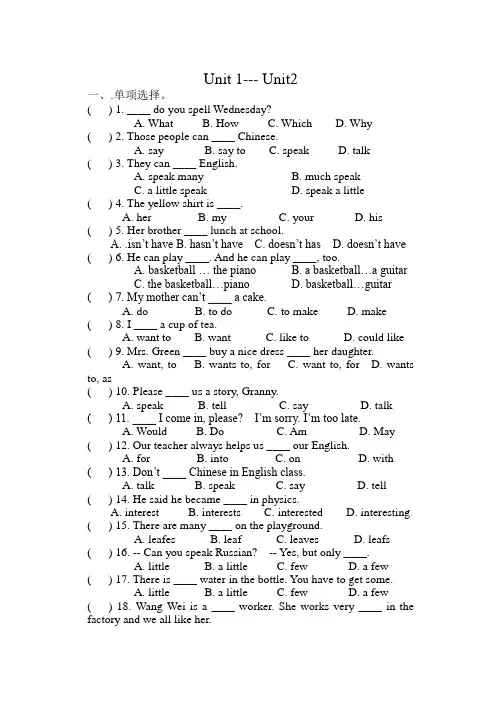
Unit 1--- Unit2一、.单项选择。
( ) 1. ____ do you spell Wednesday?A. WhatB. HowC. WhichD. Why( ) 2. Those people can ____ Chinese.A. sayB. say toC. speakD. talk( ) 3. They can ____ English.A. speak manyB. much speakC. a little speakD. speak a little( ) 4. The yellow shirt is ____.A. herB. myC. yourD. his ( ) 5. Her brother ____ lunch at school.A. .isn’t haveB. hasn’t haveC. doesn’t hasD. doesn’t have ( ) 6. He can play ____. And he can play ____, too.A. basketball … the pianoB. a basketball…a guitarC. the basketball…pianoD. basketball…guitar ( ) 7. My mother can’t ____ a cake.A. doB. to doC. to makeD. make ( ) 8. I ____ a cup of tea.A. want toB. wantC. like toD. could like ( ) 9. Mrs. Green ____ buy a nice dress ____ her daughter.A. want, toB. wants to, forC. want to, forD. wants to, as( ) 10. Please ____ us a story, Granny.A. speakB. tellC. sayD. talk ( ) 11. ____ I come in, please? I’m sorry. I’m too late.A. WouldB. DoC. AmD. May ( ) 12. Our teacher always helps us ____ our English.A. forB. intoC. onD. with ( ) 13. Don’t ____ Chinese in English class.A. talkB. speakC. sayD. tell ( ) 14. He said he became ____ in physics.A. interestB. interestsC. interestedD. interesting ( ) 15. There are many ____ on the playground.A. leafesB. leafC. leavesD. leafs ( ) 16. -- Can you speak Russian?-- Yes, but only ____.A. littleB. a littleC. fewD. a few ( ) 17. There is ____ water in the bottle. You have to get some.A. littleB. a littleC. fewD. a few ( ) 18. Wang Wei is a ____ worker. She works very ____ in the factory and we all like her.A. well, wellB. good, goodC. good, wellD. well, good( ) 19. My grandpa doesn’t want ____ at home. He wants ____ out for a walk on Sunday.A. to stay, goB. stay, goC. stay, to goD. to stay, to go ( ) 20. She can’t ____ the difference between the two cars.A. sayB. talkC. speakD. tell二、连词成句。
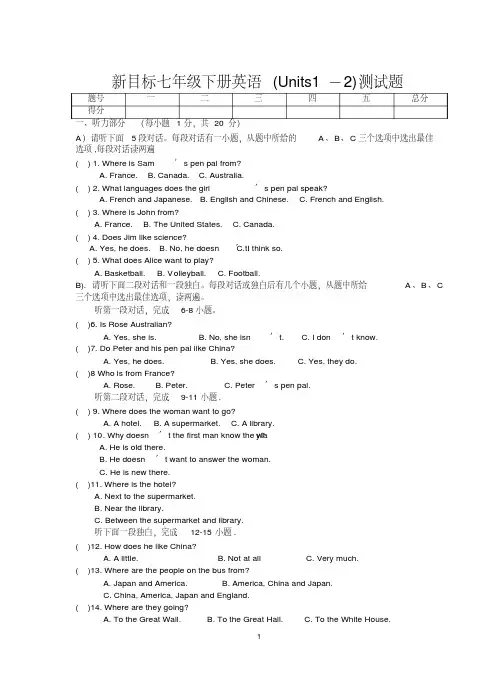
新目标七年级下册英语(Units1-2)测试题题号一二三四五总分得分一、听力部分(每小题1分,共20 分)A)请听下面5段对话。
每段对话有一小题,从题中所给的A、B、C三个选项中选出最佳选项,每段对话读两遍( ) 1. Where is Sam’s pen pal from?A. France.B. Canada.C. Australia.( ) 2. What languages does the girl’s pen pal speak?A. French and Japanese.B. English and Chinese.C. French and English.( ) 3. Where is John from?A. France.B. The United States.C. Canada.( ) 4. Does Jim like science?C. I think so.A. Yes, he does.B. No, he doesn’t.( ) 5. What does Alice want to play?A. Basketball.B. Volleyball.C. Football.B). 请听下面二段对话和一段独白。
每段对话或独白后有几个小题,从题中所给A、B、C 三个选项中选出最佳选项,读两遍。
听第一段对话,完成6-8小题。
( )6. Is Rose Australian?A. Yes, she is.B. No, she isn’t.C. I don’t know.( )7. Do Peter and his pen pal like China?A. Yes, he does.B. Yes, she does.C. Yes, they do.( )8 Who is from France?A. Rose.B. Peter.C. Peter’s pen pal.听第二段对话,完成9-11小题.( ) 9. Where does the woman want to go?A. A hotel.B. A supermarket.C. A library.y?( ) 10. Why doesn’t the first man know the waA. He is old there.B. He doesn’t want to answer the woman.C. He is new there.( )11. Where is the hotel?A. Next to the supermarket.B. Near the library.C. Between the supermarket and library.听下面一段独白,完成12-15小题.( )12. How does he like China?A. A little.B. Not at allC. Very much.( )13. Where are the people on the bus from?A. Japan and America.B. America, China and Japan.C. China, America, Japan and England.( )14. Where are they going?A. To the Great Wall.B. To the Great Hall.C. To the White House.( )15. How do they get there?A. By bike.B. On foot.C. By bus.C) 请听下面一段短文,然后根据短文内容完成表格,每个空格不超过三个单词,短文读两遍。
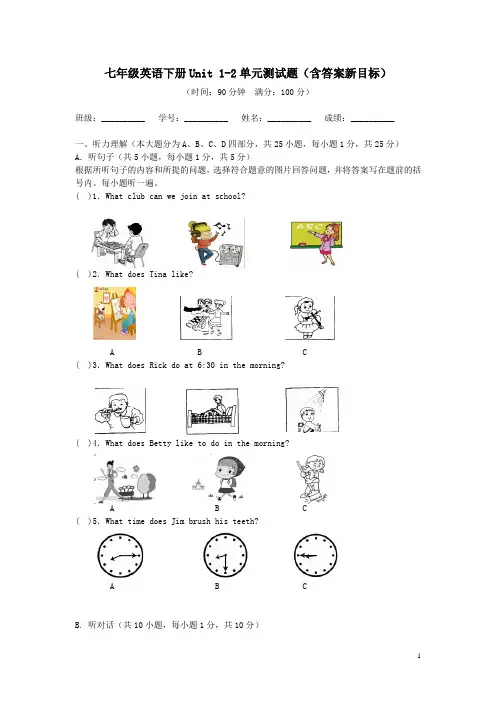
七年级英语下册Unit 1-2单元测试题(含答案新目标)(时间:90分钟满分:100分)班级:__________ 学号:__________ 姓名:__________ 成绩:__________一、听力理解(本大题分为A、B、C、D四部分,共25小题,每小题1分,共25分)A.听句子(共5小题,每小题1分,共5分)根据所听句子的内容和所提的问题,选择符合题意的图片回答问题,并将答案写在题前的括号内。
每小题听一遍。
( )1.What club can we join at school?A B C( )2.What does Tina like?A B C( )3.What does Rick do at 6:30 in the morning?A B C( )4.What does Betty like to do in the morning?A B C( )5.What time does Jim brush his teeth?A B CB. 听对话(共10小题,每小题1分,共10分)根据所听对话的内容和所提的问题,在各小题所给的三个选项中选出一个最佳选项,并将答案写在题前的括号内。
每段对话听两遍。
听第一段对话,回答第6小题。
( )6.What can Alice do?A.Play the drums.B.Play the guitar.C.Play the piano.听第二段对话,回答第7小题。
( )7.What’s the time?A.8:30.B.9:30.C.9:00.听第三段对话,回答第8小题。
( )8.Why is Sam sad?A.Because he can’t play chess.B.Because he can’t go to the club.C.Because he lost his chess.听第四段对话,回答第9小题。
( )9.What does the girl want to be?A.An English teacher.B.A music teacher.C.An art teacher.听第五段对话,回答第10小题。
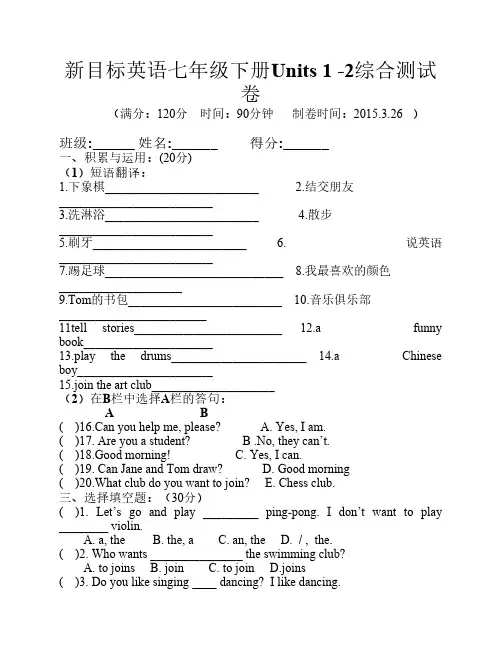
新目标英语七年级下册Units 1 -2综合测试卷(满分:120分时间:90分钟制卷时间:2015.3.26 )班级: 姓名: 得分:一、积累与运用:(20分)(1)短语翻译:1.下象棋_________________________2.结交朋友_________________________3.洗淋浴_________________________4.散步_________________________5.刷牙_________________________6. 说英语_________________________7.踢足球_____________________________ 8.我最喜欢的颜色____________________9.Tom的书包_________________________ 10.音乐俱乐部________________________11tell stories________________________ 12.a funny book_____________________13.play the drums______________________ 14.a Chinese boy______________________15.join the art club____________________(2)在B栏中选择A栏的答句:A B( )16.Can you help me, please? A. Yes, I am.( )17. Are you a student? B .No, they can’t.( )18.Good morning! C. Yes, I can.( )19. Can Jane and Tom draw? D. Good morning( )20.What club do you want to join? E. Chess club.三、选择填空题:(30分)( )1. Let’s go and play _________ ping-pong. I don’t want to play ________ violin.A. a, theB. the, aC. an, theD. / , the.( )2. Who wants _______________ the swimming club?A. to joinsB. joinC. to joinD.joins( )3. Do you like singing dancing? I like dancing.A. andB. butC. orD. so( )4. Maybe he can _________________ in our basketball team.A. isB. beC. areD.am( )5. I see some English in the room.A. peopleB. womanC. studentD.teacher( )6. Our school show is six thirty Sunday morning.A. at , inB. in , onC. at , onD. on , on( )7. They work in ___________________ same school.A. aB. anC. theD. /( )8. -Does Lily like to _____? -Yes. Here are some of her pictures.A. singB.drawC. swimD.dance( )9. Please spell this word _______________ English.A. inB. atC. withD. on( )10. They help me ________________English.A. inB. withC. onD. at( )11.- A:Can you swim? -B: Yes, I ______________.A. amB. doC. canD.does( )12. Are you good _______________old people?A. withB. atC. forD. in( )13. If you want to know that, please all _______ 622-6033.A. byB. atC. forD.on( )14. -A: _________ do you join the club? -B: Because I like music.A. WhatB. WhereC. WhyD.When( )15. We want two good players __________ basketball team.A. forB. inC. atD. on( )16.My sister likes singing, but she can’t sing .A.goodB. wellC.niceD. fine.( )17.Linda is a nice girl. Do you want to with her?A.getB. makeC.takeD. help( )18.I have good breakfast every day.A. aB. anC. theD. /( )19.Lily doesn’t like Tom, so she talks with him.A.sometimesB.neverC. alwaysually( )20.We usually have dinner half past seven the evening.A.at, inB. at, onC.at,atD. in ,on( )21.Mom tells me to teeth after eating.A.makeB.showC. brushD. look( )22.-What’s her ? -She is an English teacher.B.jobC.timeD.color( )23.I don’t have much time for breakfast, so I usually eat very .teB.wellC. earlyD.quickly( )24.I can only watch TV half an hour every evening.A. atB. inC. forD.on( )25.-Do you in the morning? -Yes, I usually run in the morning.A. eatB.exerciseC. drawD.write.( )26.-What do you usually do in the evening?-Well, I either watch TV play computer games with my brother.A. andB.butC.soD.or( )27.Fruit and vegetables are good our health. I eat them every day.A.forB.atC. inD. to( )28.- Help your brother , Mary. – OK,but where are his sweater and trousers.A.clean the roomB.eat breakfastC.take a walkD.get dressed( )29.Either he or you in the music club.A. amB. isC. areD. be( )30.I’m sorry you can’t , because we have no water(水) now.A.get upB. take a walkC. take a showerD. go to bed四、完形填空:(10分)Jane and John 1 sister and brother. They like music. Jane can play the piano. But she2 play the violin. John can’t play the piano. But he3 play the violin. Today they4 to carry(搬) a piano to5 bedroom.6 piano is heavy(沉). They can’t7 it.8 parents aren’t at home. But they9 a cousin brother Mike. He is here today. They ask Mike to 10 them.( )1. A. is B. am C. are( )2. A. can B. can’t C. doesn’t( )3. A. can B. can’t C. doesn’t( )4. A. like B. want C. can( )5. A. Jane B. his C. Jane’s( )6. A. The B. a C. /( )7. A. take B. carry C. help( )8. A. Jane’s and John B. Jane and John’s C. They’s( )9. A. have B. like C. want( )10. A. come B. go C. join五、阅读理解:(20分)AJimmy lives in the country(农村), and he loves playing in the river(河) near his house. But his father gets a job in a big city, and he moves(搬) there with his family.Their new house has a garden(花园), but the garden is very small. Jimmy isn’t happy. “Is there a river near here?” He asks his mother on the first morning. His mother answers, “No, there isn’t, but there is a nice park(公园) near here and there’s a pool(池塘) in it. We’re going there this afternoon.”Jimmy is happy now.After lunch Jimmy and his mother go to the park. Jimmy wants to walk near the pool, but there is a sign(标记) before it. His mother reads it to him,“Warning(警告): This pool is dangerous(危险). 367 people fell into(掉入) it.” Jimmy looks into the pool carefully, and he says, “But I can’t see them.”( )1. Jimmy likes playing ______________________ very much.A. in the parkB. in the gardenC. in the riverD. in the room ( )2. Jimmy’s father works _______________________.A. in the countryB. in the big cityC.. in the parkD.in the zoo.( )3. There is _____________ near Jimmy’s new house.A. a riverB. a gardenC. a parkD.a house( )4. Jimmy goes to the park with ___________________.A. his fatherB. his motherC. his teacherD.his brother( )5. Which isTrue(真实的)?A. Jimmy’s family move(搬) to the big city.B. There are(有)367 people in the pool.C. Jimmy fell into the pool.D. Jimmy’s new house doesn’t have a garden.BTom and Mike are good friends. They are kind to children. They want to find summer jobs. One day Tom tells Mike that Beidaihe Kids Summer Camp needs help with sports, music and computers. They are both very glad to hear(听说) this.Tom can play basketball and volleyball, and he can swim, too. Mike can play the violin, the trumpet, the drums and the guitar. Tom and Mike like computers very much. Can they join the Summer Camp?( )6. Tom and Mike want to ________________.A.find summer jobsB. be good with childrenC. join the Summer CampD.find friends.( )7. What does the Summer Camp(夏令营) need help with?A. Flying kites .B. Sports, music and computers.C. Making cakes.D.English( )8. Tom can play ________________________.A. ballsB. computer gamesC. musicD. the piano ( )9. Mike can play ____________________.A. the drumsB. volleyballC. basketballD.soccer ( )10. What do Tom and Mike both like?A. Football.B. Computers.C. Swimming.D.Singing六、单词拼写:(10分)1. I like _______________(跳舞) and playing the guitar.nglang is her favorite ________________(音乐家)3. She is Chinese, but she can__________________(说) English very well.4. We all like _______(故事) and sports.5. He is ___________ _____________(擅长于)playing pingpong.6. She gets home at ___________(一刻钟,四分之一)to five in the evening.7. Can you _________________ (展示;给……看) us how to play the guitar?8. She says she likes ____________(画画).9. He wants to ______________(参加) the art club in the evening.10. Do you want to go to the _________________(游泳) club.七、句型转换:(15分,每空0.5分)1. Can he play chess?(做否定回答)No, _____________ ___________2. She can sing and dance. (否定句)She ___________ ______________ ____________ dance.3. Li Lei can play the violin. (一般疑问句)_____________ Li Lei ________________ the violin?4. She wants to join the music club. (就划线部分提问)__________ _________ __________ she want to join?5.I can play the violin.( 就划线部分提问)____________ ____________ you ____________?6.Alice usually gets up at 6:00 am.(改为同义句)Alice usually gets up at 6:00 _________ _________ .7.He goes to bed at 10:00 in the evening. (就划线部分提问)_________ _________ _________ he _________to bed in the evening?8.She does her homework at half past four in the afternoon. (改为否定句)She _________ _________ her _________at half past four in the afternoon.9.He brushes his teeth in the morning.(变为一般疑问句)_________ he _________ _____ _________ in the morning?10.He always has lunch at half past twelve. (改为相反含义的句子,使用相对的频度副词)He _________ _________ _________ at half past twelve.八、书面表达(15分)根据下面的作息时间表,以Tom’s Day为题,写一篇短文。
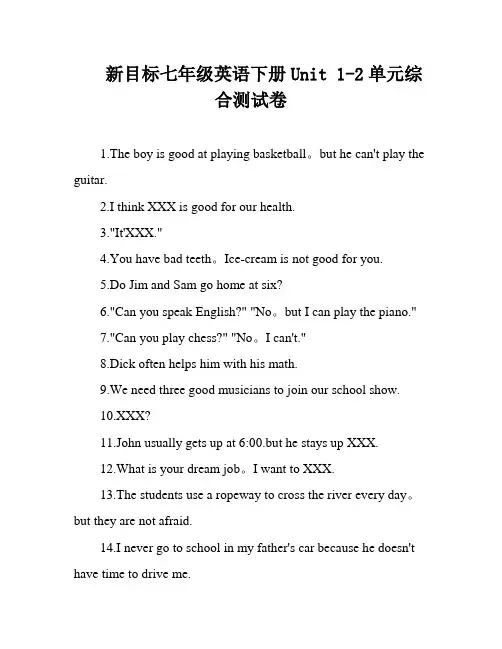
新目标七年级英语下册Unit 1-2单元综合测试卷1.The boy is good at playing basketball。
but he can't play the guitar.2.I think XXX is good for our health.3."It'XXX."4.You have bad teeth。
Ice-cream is not good for you.5.Do Jim and Sam go home at six?6."Can you speak English?" "No。
but I can play the piano."7."Can you play chess?" "No。
I can't."8.Dick often helps him with his math.9.We need three good musicians to join our school show.10.XXX?11.John usually gets up at 6:00.but he stays up XXX.12.What is your dream job。
I want to XXX.13.The students use a ropeway to cross the river every day。
but they are not afraid.14.I never go to school in my father's car because he doesn't have time to drive me.15.I usually ride my bike to school。
but my friend Susan takes the bus.16.No。
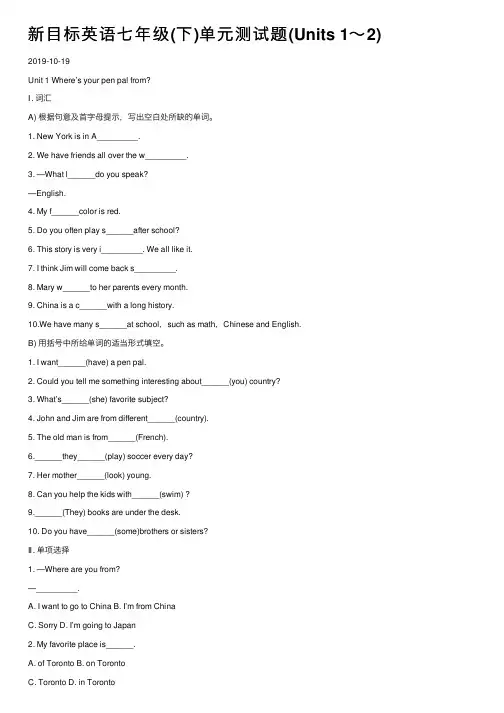
新⽬标英语七年级(下)单元测试题(Units 1~2) 2019-10-19Unit 1 Where’s your pen pal from?Ⅰ. 词汇A) 根据句意及⾸字母提⽰,写出空⽩处所缺的单词。
1. New York is in A_________.2. We have friends all over the w_________.3. ―What l______do you speak?―English.4. My f______color is red.5. Do you often play s______after school?6. This story is very i_________. We all like it.7. I think Jim will come back s_________.8. Mary w______to her parents every month.9. China is a c______with a long history.10.We have many s______at school,such as math,Chinese and English.B) ⽤括号中所给单词的适当形式填空。
1. I want______(have) a pen pal.2. Could you tell me something interesting about______(you) country?3. What’s______(she) favorite subject?4. John and Jim are from different______(country).5. The old man is from______(French).6.______they______(play) soccer every day?7. Her mother______(look) young.8. Can you help the kids with______(swim) ?9.______(They) books are under the desk.10. Do you have______(some)brothers or sisters?Ⅱ. 单项选择1. ―Where are you from?―_________.A. I want to go to ChinaB. I’m from ChinaC. SorryD. I’m going to Japan2. My favorite place is______.A. of TorontoB. on TorontoC. TorontoD. in Toronto3. What language do you______?A. speaksB. speakC. saysD. say4. ―______Lisa______English?―Yes,a little.A. Can; speakB. Can; speaksC. Can; saysD. Can; say5. Where______your pen pal come from?A. areB. doC. doesD. is6. ―______is that man?―He is my brother.A. WhoB. WhoseC. WhenD. Why7. ―_________?―Chinese and French.A. What languages does Lily speakB. Where is she fromC. Where does Lily come fromD. When does Lily learn Chinese8. ―What’s your favorite______?―Science.A. movieB. subjectC. foodD. sport9. Frank often helps______with______English.A. I; meB. my; meC. me; myD. me; I10. Is the letter______your pen pal,Dale?A. fromB. inC. atD. with11. ―When is your birthday?―It’s______May 10.A. ×B. onC. atD. in12. I have______old book.______book is very interesting.A. an; AB. a; TheC. an; TheD. the; A13. ―Where______your pen pal live?―He______Wuhan.A. do; liveB. does; livesC. does; live inD. does; lives in14. ―Can you draw?―Yes,______.A. manyB. lots ofC. littleD. a little15. John likes going to the movies with his friends and______sports.A. playingB. to playC. playsD. playⅢ. 完形填空This is Lucy and that is Lily. They are twins(双胞胎). They __1__ from America.They are students __2__ No. 1 Middle School. They’re in __3__ same class. They go to school __4__ days a week. On Saturday and Sunday they__5__ go to school. They stay at home. Sometimes(有时) they go to the zoo or the park __6__ their home in the afternoon. Lucy likes swimming,but Lily likes __7__ basketball. Saturday and Sunday are their favorite days. Their father,Mr Smith,is a teacher in another __8__. He __9__ English. He likes working in the school. Their mother __10__. She likes staying at home and doing some housework.1. A. is B. come C. comes D. coming2. A. in B. on C. for D. with3. A. a B. × C. the D. an4. A. four B. five C. six D. seven5. A. × B. don’t C. doesn’t D. isn’t6. A. in B. at C. near D. for7. A. playing B. play C. plays D. to playing8. A. school B. schools C. a school D. the school9. A. teach B. teaches C. teaching D. to teach10. A. doesn’t work B. doesn’t stay at homeC. doesn’t likeD. isn’t workⅣ. 阅读理解(A)Do you know the girl in a hat with flowers on it? Her name is Hezi. Hezi is a nice Japanese girl,my new pen pal. She lives in Tokyo.I like Hezi. I don’t know Japanese,and Hezi doesn’t know Chinese. But we know some English. So we write to eachother(彼此) in English. We are the same age. We are 12 years old.My favorite subject is math. But her favorite subject is biology. We all like football very much. She lives with her parents. She is their only child. She likes going to the movies on weekends. She likes cartoons best.She hopes to come to Beijing this summer(夏天). I feel very happy about it.根据短⽂内容,补全下表信息。
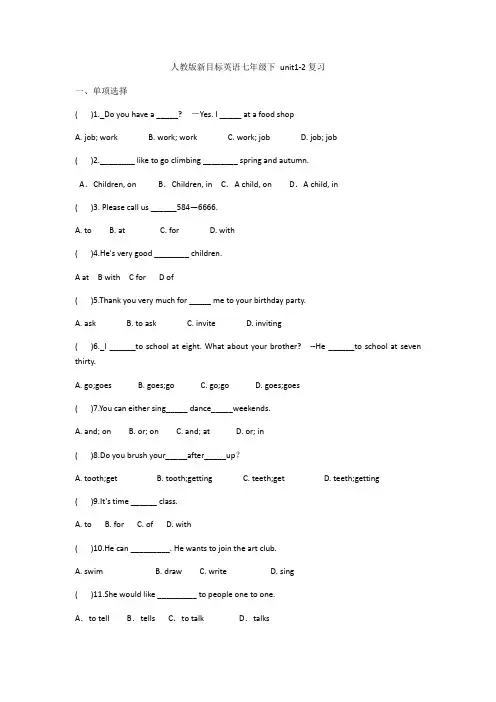
人教版新目标英语七年级下unit1-2复习一、单项选择( )1._Do you have a _____? -Yes. I _____ at a food shopA. job; workB. work; workC. work; jobD. job; job( )2.________ like to go climbing ________ spring and autumn.A.Children, on B.Children, in C.A child, on D.A child, in( )3. Please call us ______584—6666.A. toB. atC. forD. with( )4.He's very good ________ children.A atB withC forD of( )5.Thank you very much for _____ me to your birthday party.A. askB. to askC. inviteD. inviting( )6._I ______to school at eight. What about your brother? --He ______to school at seven thirty.A. go;goesB. goes;goC. go;goD. goes;goes( )7.You can either sing_____ dance_____weekends.A. and; onB. or; onC. and; atD. or; in( )8.Do you brush your_____after_____up?A. tooth;getB. tooth;gettingC. teeth;getD. teeth;getting( )9.It’s time ______ class.A. toB. forC. ofD. with( )10.He can _________. He wants to join the art club.A. swimB. drawC. writeD. sing( )11.She would like _________ to people one to one.A.to tell B.tells C.to talk D.talks( )12.My father ________ buy a new watch ______ my birthday.A. want to, forB. wants, forC. wants to, withD. wants to, for( )13.We need a math teacher ______ math.A. to teachB. teachC.teachingD. teaches( )14.The music is nice. Do you want to it? A. look at B. listen to C. play with D. help with( )15.Jim’s brother usually_____ TV in the evening.A. watchesB. looksC. seesD. looks at( )16.I usually ______ at nine thirty at night.A. get to schoolB. get upC.go homeD. go to bed( )17.Clark is a teacher and he _________ Chinese.A. teachesB. watchesC. asksD. calls( )18.We are playing football. Come and _____________ our game.A. joinB. join inC. playD. do( )19.Do you like _____ a bus to school?A. takesB. takingC. takeD. by( )20.We usually get ______quickly in the morning.A. DressB. dressingC. dressesD. dressed( )21.Jane always gets up early, so she's never late ______work.A. atB. withC. forD.on( )22.Can you speak English? — Yes, but only ____.A. littleB. a littleC. fewD. a few( )23.Jim______from eight in the morning_____eleven thirty at night every day.A. work; atB. works; toC. work; inD. works; of( )24.Vegetables are good _____us.A. atB. withC. forD. in( )25.Do you want ______ to a movie?A、goB、goesC、to goD、going( )26.Who teaches______ English? -Miss Yao.A.yoursB. yourC.youD.your( )27.She _____her _____every evening at home.A.does; homeworkB. does ; homeworksC. do; homeworkD. do; homeworks( )28.—Can you help kids with ______? —Yes,I can.A. swimmingB.to swimC.swimsD.swim( )29.My little brother often ____us many fun stories.A saysB tellC tellsD speaks( )30.I get home_____school at half_____five.A. after; pastB. from; toC. to; pastD. from; past二、完成句子1.“你什么时候去上班?” “十一点钟,所以我上班从不迟到。
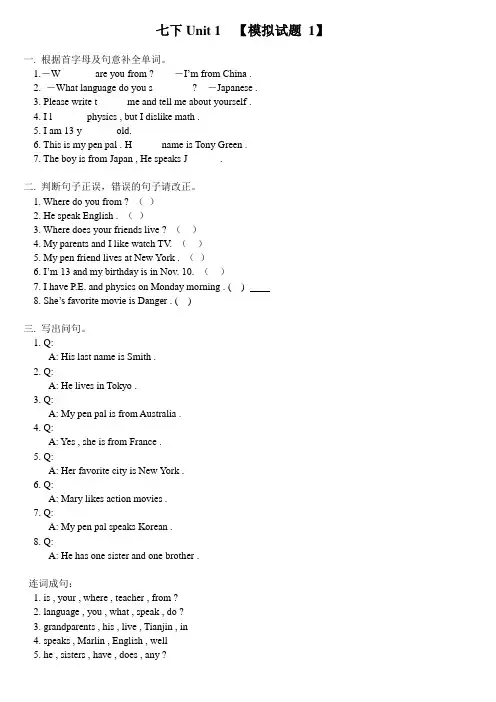
七下Unit 1 【模拟试题1】一. 根据首字母及句意补全单词。
1.-W ______ are you from ? -I’m from China .2. -What language do you s _______ ? -Japanese .3. Please write t _____ me and tell me about yourself .4. I l ______ physics , but I dislike math .5. I am 13 y ______ old.6. This is my pen pal . H _____ name is Tony Green .7. The boy is from Japan , He speaks J ______.二. 判断句子正误,错误的句子请改正。
1. Where do you from ? ()_______________2. He speak English . ()________________3. Where does your friends live ? ()__________4. My parents and I like watch TV. ()_________5. My pen friend lives at New York . ()___________6. I’m 13 and my birthday is in Nov. 10. ()_______7. I have P.E. and physics on Monday morning . ( )8. Sh e’s favorite movie is Danger . ( )_____________三. 写出问句。
1. Q: ______________________________A: His last name is Smith .2. Q: ______________________________A: He lives in Tokyo .3. Q: _____________________________A: My pen pal is from Australia .4. Q: __________________________A: Yes , she is from France .5. Q: __________________________A: Her favorite city is New York .6. Q: _________________________A: Mary likes action movies .7. Q: __________________________A: My pen pal speaks Korean .8. Q: ___________________________A: He has one sister and one brother .连词成句:1. is , your , where , teacher , from ? ______________2. language , you , what , speak , do ? _____________3. grandparents , his , live , Tianjin , in ____________4. speaks , Marlin , English , well ________________5. he , sisters , have , does , any ? __________________【模拟试题2】I、词汇1. ---Where does your uncle l______? ---Japan.2. A_________ are from the United States.3. His brother ________(要) a Japanese pen pal.4. They _______ (住在) in Beijing.5. ________comes after July.B) 根据所给单词填入一个正确的形式。
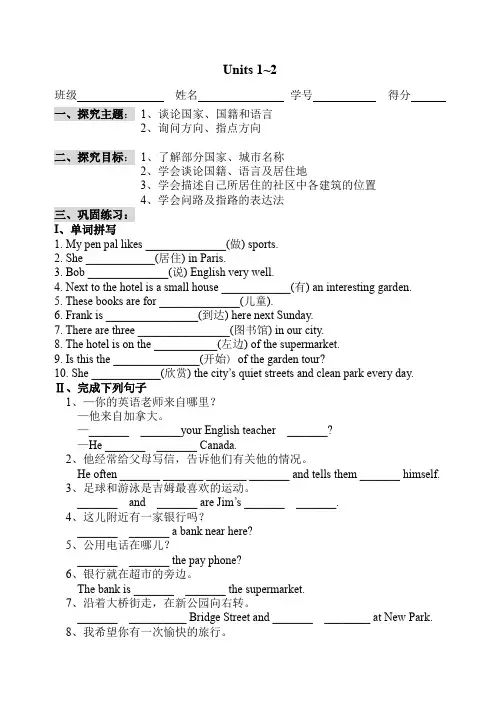
Units 1~2班级姓名学号得分一、探究主题:1、谈论国家、国籍和语言2、询问方向、指点方向二、探究目标:1、了解部分国家、城市名称2、学会谈论国籍、语言及居住地3、学会描述自己所居住的社区中各建筑的位置4、学会问路及指路的表达法三、巩固练习:I、单词拼写1. My pen pal likes ______________(做) sports.2. She ____________(居住) in Paris.3. Bob ______________(说) English very well.4. Next to the hotel is a small house ____________(有) an interesting garden.5. These books are for ______________(儿童).6. Frank is ________________(到达) here next Sunday.7. There are three ________________(图书馆) in our city.8. The hotel is on the ___________(左边) of the supermarket.9. Is this the _______________(开始) of the garden tour?10. She ____________(欣赏) the city’s quiet streets and clean park every day.Ⅱ、完成下列句子1、—你的英语老师来自哪里?—他来自加拿大。
—_______ _______your English teacher _______?—He _______ _______ Canada.2、他经常给父母写信,告诉他们有关他的情况。
He often _______ _______ _______ _______ and tells them _______ himself.3、足球和游泳是吉姆最喜欢的运动。
人教版新目标英语七年级下unit1-2复习一、单词填空1.We n_____ help at the old people’s home.2.Zheng Yuanjie can w ___________ many interesting stories. He's a writer.3.We w______ students for the school show.4.He likes to play basketball. So he wants to j_____ the basketball club.5.Can they play ________ (象棋)?6.Alice wants to join the music club for the school ________(演出).7.Can you s______ your family photo to me?8.Sally finds a new job and she goes to w_____ at seven o’clock every day.9.We are in the same ________(组)and we should help each other(互相).10.Can you s______ French? -Yes, I can.11.There are some children in the playground.______(一半)of them are boys.12.You can find a good j______ if(如果) you study hard now.13.I think Lin Dan is the b_____player and I like him very much.14.Please _______ (帮助) me with English.15.What a f______ time to eat fruit after dinner.16.We don’t go to school on S______ or Sunday every week.17.Now the room is very c______.It's not dirty.18.- Who is your favorite m ___________ ? -Liu Huan.19.They often do morning e________ at school.20.Wang Han is a famous TV host(主持人)and he ________(工作)for Hunan TV station.二、用所给单词的适当形式适当形式填空1.His sister loves ____(play) the piano very much.2.Look! Mike is ______(write)an e-mail to his cousin.3.He _______ (not like) the school show.4.They ______ (usual) go home after school.5.My father usually takes a ________(shower) in the morning.6.You need_____(brush) your teeth after eating.7.We always _____(clean)our classroom after school.8.She ______( do) her homework in the evening.9.--- Does your little brother like ______ (eat) chicken?--- No, he doesn't.10.Please come in and have a cup of tea with _______ (we).11.Let’s join the___________ (paint)club.12.December 22nd is his _____(fifty)birthday.13. I don't have much time for breakfast, so I usually eat very _____ (quick)14.Jenny has found it easy to make _______(friend)at school.15.Mary is busy _____ (do)her homework16.My sister usually gets up and gets _____(dress) at about five forty.17.Sally is busy______(do) her homework.18.My brother often_____(study) with me.19.Mr Wang teaches______(they )math.20.I speak English very___________ (good),and I join the English club.21.We usually have breakfast at six ______ (clock) in the morning.22.Helping with sports for English-speaking students is very ___________(relax)and easy.23.Let’s___________ (sing) a dong before the class.24.Who_____(help)you with your English?25.The old man saves(挽救) many animals______(life) every year.答案一、单词填空1.need2.write3.want4.join5.chess6.shows7.show8.work9.group 10.speak11.half 12.job 13.best 14.help 15.funny16.Saturday 17.clean 18.musician 19.exercise 20.works二、用所给单词的适当形式适当形式填空1.playing2.writing3.doesn't likeually5.shower6.to brush7.clean8.does9.to eat 11.painting 12.fiftieth 13.quickly 14.friends 15.doing 16.dressed 17.doing 18.studies 20.well21.o'clock 22.relaxing 23.sing 24.helps 25.lives。
Unit One复习词组1. 你哥哥的笔友 your brother’s pen pal2. 来自于…… come from = be from3. 居住在…… live in4. 说一点儿法语 speak a little French5. 他笔友最喜欢的语言 his pen pal’s favorite language6. 在周末 on weekends7. 告诉我你自己的情况 tell me about yourself 8. 什么语言 what language9. 给我写信 write (a letter) to me 10. 喜欢/不喜欢做某事 like doing / dislike doing sth. 课文句子1.Where is your pen pal from = Where does your pen pal come from?你的笔友来自哪里?She is from Japan.= She comes from Japan. 她来自日本。
2.Where does your pen pal live ? 你笔友居住在哪里?He lives in Sydney.他住在悉尼。
3.What language do you speak ? 你说什么语言? I speak Chinese.我说汉语。
4.What language can you speak?你会说什么语言?I can speak Chinese and a little English. 我会说汉语和一点点英语。
5.Does she have any brothers or sisters? 她有兄弟姐妹吗?Yes,she does. She has two brothers and two sisters. 是的,她有兄弟姐妹。
她有两个哥哥和两个妹妹。
6.What’s her favorite subject in school ?她在学校最喜欢的学科是什么?Her favorite subject in school is math.她在学校最喜欢的学科是数学。
人教版新目标英语七年级下unit1-2复习一、单项选择( )1.It’s six o’clock in the morning. It’s time ________.A. get upB. for get upC. to get upD. of getting up( )2.We want two musicians ____ our rock band. Please call me ____ 123—4567.A. for, forB. for, atC. with, atD. at, for( )3.Tom can______ English. I can______it in English, too.A. speak; speakB. say; speakC. say; sayD. speak; say( )4.My uncle gets up early. He is never late ______work.A. inB. withC. forD. at( )5.She _____her _____every evening at home.A.does; homeworkB. does ; homeworksC. do; homeworkD. do; homeworks( )6.Jim’s brother usually________TV in the evening.A. watchesB. looksC. seesD. looks at( )7.It’s time ______ class. A. to B. for C. of D. with( )8.My brother can play _________. And he can play ________, too.A.a violin, footballB. the violin, the footballC. the violin, footballD. the violin, a footba( )9.The young ________ plays the ________ very well.A.pianist, piano B.piano, pianist C.pianist, pianist D.piano, piano ( )10.Can you speak English? — Yes, but only ____.A. littleB. a littleC. fewD. a few( )11.Thank you very much for _____ me to your birthday party.A. askB. to askC. inviteD. inviting( )12.—Can you help kids with ______? —Yes,I can.A. swimmingB.to swimC.swimsD.swim( )13.Clark is a teacher and he _________ Chinese.A. teachesB. watchesC. asksD. calls( )14.—My cousin is good at drawing. —Maybe he can ______ the art club.A. joiningB. to joinC. joinsD. join( )15.I usually ______ at nine thirty at night.A. get to schoolB. get upC.go homeD. go to bed( )16.My sister _______ home at 5:00 every day.A. getsB. gets toC. getD. get to( )17._The oranges _____sweet. --Of course. They are from Yongxing,Chenzhou.A. tasteB. eatC. drink( )18._I ______to school at eight. What about your brother? --He ______to school at seven thirty.A. go;goesB. goes;goC. go;goD. goes;goes( )19.It’s _________to listen to music in bed at home.A relaxedB relaxingC relaxesD relaxs( )20.I want________ the swimming club.A joinB to joinC inD be( )21.________ like to go climbing ________ spring and autumn.A.Children, on B.Children, in C.A child, on D.A child, in( )22.You can either sing_____ dance_____weekends.A. and; onB. or; onC. and; atD. or; in( )23.Dick never eats vegetables, so this is not a _____ life.A. happyB. healthyC. interestingD. sad( )24.It’s a (an) ______ movie and we all like it.A. difficultB. interestingC. tidyD. boring( )25.We need a math teacher ______ math.A. to teachB. teachC.teachingD. teaches( )26.We usually get ______quickly in the morning.A. DressB. dressingC. dressesD. dressed( )27.Do you like _____ a bus to school?A. takesB. takingC. takeD. by( )28.Does Jack teach ______ Chinese or math?A. theirB. youC. ourD. his( )29.My father ______ his coat and goes to work.A. put onB. puts inC. puts onD. put in( )30._Would you like an apple or a pear? -- _____ ,I really don't mind.A. BothB. EitherC. Neither二、完成句子1.史密斯太太喜欢和孩子们一起做游戏。
人教版新目标英语七年级下unit1-2复习一、单项选择( )1.—Can you help kids with ______? —Yes,I can.A. swimmingB.to swimC.swimsD.swim( )2.We usually do _________ homework at home.A. ourB. usC. weD. me( )3.Jim______from eight in the morning_____eleven thirty at night every day.A. work; atB. works; toC. work; inD. works; of( )4.—I think drinking milk is good ______ our health. —Yes, I agree with you A. for B. to C. with D. at( )5.It's good for us to ____ a walk after dinner.A. takeB. make.C. playD. think( )6.Clark is a teacher and he _________ Chinese.A. teachesB. watchesC. asksD. calls( )7.It’s time ______ class.A. toB. forC. ofD. with( )8.It’s _________to listen to music in bed at home.A relaxedB relaxingC relaxesD relaxs( )9.We need her______with music.A. to helpB. helpingC. helpD. help( )10.Bob can play ________ tennis but can’t play _______ guitar.A.the;B./;/C.the;/D./;the( )11.My brother often _____ English on the radio .A. hearsB. listensC. listen toD. listens to( )12.Who teaches______ English? -Miss Yao.A.yoursB. yourC.youD.your( )13.________ like to go climbing ________ spring and autumn.A.Children, on B.Children, in C.A child, on D.A child, in( )14.Can you speak English? — Yes, but only ____.A. littleB. a littleC. fewD. a few( )15.What time does Lisa_____after school?A. watch TVB. watches TVC. do her homeworksD. does her homeworks( )16.My sister _______ home at 5:00 every day.A. getsB. gets toC. getD. get to( )17.Do you want ______ to a movie?A、goB、goesC、to goD、going( )18.She would like _________ to people one to one.A.to tell B.tells C.to talk D.talks( )19.We usually get ______quickly in the morning.A. DressB. dressingC. dressesD. dressed( )20.My father ______ his coat and goes to work.A. put onB. puts inC. puts onD. put in( )21._Would you like some Wenchang Chicken?. It _____delicious. -Yes, please. It's my favorite.A.SoundsB. tastesC. feels( )22.I have only two tickets for TF Boys' concert. ______ you ______he can go with me.A. Either; orB. Either; nor;C. Both; andD. Not only; but also( )23._Do you have a _____? -Yes. I _____ at a food shop.A. job; workB. work; workC. work; jobD. job; job( )24. Please call me ______ 686-8977.A. inB. aboutC. atD. with( )25.Jane always gets up early, so she's never late ______work.A. atB. withC. forD.on( )26.Do you brush your_____after_____up?A. tooth;getB. tooth;gettingC. teeth;getD. teeth;getting ( )27.Do you like _____ a bus to school?A. takesB. takingC. takeD. by( )28.Thank you very much for _____ me to your birthday party.A. askB. to askC. inviteD. inviting( )29.It’s six o’clock in the morning. It’s time ________.A. get upB. for get upC. to get upD. of getting up( )30.Vegetables are good _____us.A. atB. withC. forD. in二、完成句子1.下个学期我们有许多校园活动。
Unit1 重点短语:play the guitar 弹吉他play the piano 弹钢琴play the trumpet吹喇叭play the drums 敲鼓play chess 下象棋speak English 说英语speak a little English 说一点英语say it in English 用英语说它join the art club 加入艺术俱乐部join the basketball club加入篮球俱乐部join the swimming club加入游泳俱乐部what club 什么俱乐部play the guitar well 弹吉他弹得好be good with sb和某人相处的好be good for···对······有益处be good at···擅长······help sb with sth帮助某人干某事help kids with English/swimming帮助孩子们游泳do Chinese kung fu表演中国功夫be in参加,加入call sb at + 电话号码给某人打电话拨打···号have an e-mail address 有电子邮件的地址rock band 摇滚乐队a little 一点(后接不可数名词)in the music room 在音乐教室里show sth to sb = show sb sth 把某物给某人看teach sb.sth 教某人某事teach us English练习:Ⅰ.用所给词的适当形式完成句子1.—Can you help kids with (dance)? —Yes,I can.2.They want (join)the baseball club.3.Can you (sing)?4.The girl likes music.She wants to be a (music).5.Do you want to join the (swim)club?6.Are you good with (kid),Jim?7.I can play the trumpet but I can’t play it(good).8. Do you want to join the ______ (swim) club?9. Can Mary and Alice ___________ (play) computer games?e and ___________(join) the art club.11. She wants ___________ (dance) with her friends.12. Thanks for ___________ (help) me.Ⅱ.根据括要求改写句子1.club,art,want,the,to,I,join (连词成句)2.Mary can speak English.(改成一般疑问句并作否定回答)3.My father can play the guitar very well.(改成否定句)4.I want to join the music club.(对画线部分提问) club do you want to ?5.Linda likes music.(改成否定句) Linda music.6. Bill can swim. (对划线部分提问) _________ __________ Bill _________?7. We want to join the basketball club. 对划线部分提问___________ ___________ do you want to join?8. Can your friends play chess? 作否定回答9. I think he can play soccer. 改为否定句I ___________ ___________ he ___________ play soccer.Ⅲ.用play或play the完成句子1.Jenny can volleyball ,and she can violin.2.Jet can trumpet ,and he can basketball.3.Mary can piano,but she can’t guitar.4.Bob can ping-pong ,but he can’t games.5.Tony can chess, and he can baseball.Ⅳ.用can, can’t,do, don’t, doesn’t,does完成句子1.—he play soccer well? —Yes,he can.2.I play the guitar,but I can’t play it well.3.—your mother want to join the basketball club? —No,she doesn’t.4.The girl like chess,but she likes volleyball.5.—they have basketballs? —No,they don’t.Ⅴ.单项选择( )1. Can John play the ____ well?A. pianoB. basketballC. chessD.football( )2. My sister can't ___________ in a river.A.skateB.runC.swimD.jump( )3.Let’s go and pl ay ___ ping-pong. I don’t want to play ____ violin.A. a, theB. the, aC. X, the( )4.Who wants ____ the swimming club?A. to joinsB. joinC. to join( )5.Maybe he can _______ in their basketball team.A. isB. beC. are( )6.I can’t sing Japanese songs very _____.A. wellB. muchC. good( )7.They work in _____ same school.A. aB. anC. the( )8.They help me _____ Japanese.A. inB. withC. on( )9.Are you good __ kids?A. withB. atC. for( )10.We want two good musicians _____ our rock band.A. forB. inC. At( ) 11.The girl can ____English and she can ____ it in English very well.A. say, speakB. tell, speakC. speak, talkD. speak, say( ) 12. Let me help you _________ swimming?A. AtB. withC. aboutD. on( )13. His grandmother always _________ him funny stories.A. saysB. talksC. speaksD. tells( )14. Can you ________ English?A. speakB. talkC. sayD. tell( )15. Can he __________ basketball?A. playB. playsC. playingD. /( )16. My brother wants ________ the chess club.A. joinB. to joinC. joinsD.join to( )17. Mary can play the chess________ she can't swim.A. andB. orC. butD. so( )18.---- _______ do you want to join? --- I want to join the chess club.A. WhatB.AreC. CanD. Does( )19. He can sing ___________ he can't dance.A. andB.orC. but D . on( )20. My brother can’t sing ___________ play the guitar.A. andB. orC. butD. only( )21. The teacher ___________ the picture ___________ us.A. shows, toB. shows, forC. show, atD. shows, aboutⅥ. 阅读理解Dear Mr. Brown,My name is Tom. I’m not famous now. But maybe I can be famous someday! I can’t sing or dance or act in movies, but I do many other things. I can play three instruments: the guitar, the violin and the drums. I think Ican be in the music club. Maybe I can be a famous musician. I like to read story books and I can write stories.Maybe I can be a famous writer. I like sports, too, but I am not good at sports. Can I join you?1. What’s the underlined word “instruments” in Chinese? It means _____.A. 乐谱B. 乐器C. 乐章D. 琴2. What can’t Tom do? He can’t ___________.A. readB. write storiesC. play the violinD. act in movies3. Tom thinks he can be a famous ________ or a famous writer.A. musicianB. actorC. SingerD. sports man4. What club can Tom join?A. Art club.B. Movie Club.C. Chess club.D. Music club.5. Why doesn’t Tom be in sports club? ___________.A. He doesn’t like sportsB. He doesn’t do well in sportsC. He is not strong enoughD. He thinks sports are boringUnit2 重点短语句式精讲What time do you usually get up?1)这是一个用来询问什么时间做某事的常用句型,意思是“你几点起床?”。